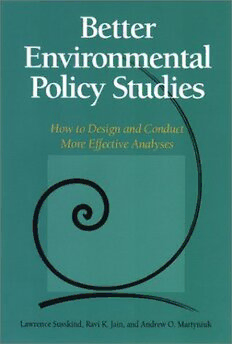Download Better Environmental Policy Studies: How To Design And Conduct More Effective Analyses PDF Free - Full Version
Download Better Environmental Policy Studies: How To Design And Conduct More Effective Analyses by Lawrence Susskind, Ravi K. Jain, Andrew O. Martyniuk in PDF format completely FREE. No registration required, no payment needed. Get instant access to this valuable resource on PDFdrive.to!
About Better Environmental Policy Studies: How To Design And Conduct More Effective Analyses
Environmental policy studies commissioned by government agencies or other stakeholders can play a vital role in environmental decisionmaking; they provide much-needed insight into policy options and specific recommendations for action. But the results of even the most rigorous studies are frequently misappropriated or misunderstood and are as likely to confuse an issue as they are to clarify it.Better Environmental Policy Studies explores this problem, as it considers the shortcomings of current approaches to policy studies and presents a pragmatic new approach to the subject. Reviewing five cases that are widely regarded as the most effective policy studies to have been conducted in the United States in the last few decades, the authors present a comprehensive guide to the concepts and methods required for conducting effective policy studies. The book: describes and explains the conventional approach to policy studies and its shortcoming presents the history, impacts, and common elements of five successful policy studies offers an in-depth look at the different tools and techniques of policy analysis extends the concepts and principles of successful policy studies to their potential uses in the international arenaBetter Environmental Policy Studies presents a practical, battle-tested approach to overcoming the obstacles to formulating effective environmental policy. It is an invaluable resource for students and faculty in departments of environmental studies, public policy and administration, and planning, as well as for professional policy analysts and others involved with making decisions and mediating disputes over environmental issues.
Detailed Information
| Author: | Lawrence Susskind, Ravi K. Jain, Andrew O. Martyniuk |
|---|---|
| Publication Year: | 2001 |
| ISBN: | 9781417539789 |
| Pages: | 203 |
| Language: | English |
| File Size: | 9.411 |
| Format: | |
| Price: | FREE |
Safe & Secure Download - No registration required
Why Choose PDFdrive for Your Free Better Environmental Policy Studies: How To Design And Conduct More Effective Analyses Download?
- 100% Free: No hidden fees or subscriptions required for one book every day.
- No Registration: Immediate access is available without creating accounts for one book every day.
- Safe and Secure: Clean downloads without malware or viruses
- Multiple Formats: PDF, MOBI, Mpub,... optimized for all devices
- Educational Resource: Supporting knowledge sharing and learning
Frequently Asked Questions
Is it really free to download Better Environmental Policy Studies: How To Design And Conduct More Effective Analyses PDF?
Yes, on https://PDFdrive.to you can download Better Environmental Policy Studies: How To Design And Conduct More Effective Analyses by Lawrence Susskind, Ravi K. Jain, Andrew O. Martyniuk completely free. We don't require any payment, subscription, or registration to access this PDF file. For 3 books every day.
How can I read Better Environmental Policy Studies: How To Design And Conduct More Effective Analyses on my mobile device?
After downloading Better Environmental Policy Studies: How To Design And Conduct More Effective Analyses PDF, you can open it with any PDF reader app on your phone or tablet. We recommend using Adobe Acrobat Reader, Apple Books, or Google Play Books for the best reading experience.
Is this the full version of Better Environmental Policy Studies: How To Design And Conduct More Effective Analyses?
Yes, this is the complete PDF version of Better Environmental Policy Studies: How To Design And Conduct More Effective Analyses by Lawrence Susskind, Ravi K. Jain, Andrew O. Martyniuk. You will be able to read the entire content as in the printed version without missing any pages.
Is it legal to download Better Environmental Policy Studies: How To Design And Conduct More Effective Analyses PDF for free?
https://PDFdrive.to provides links to free educational resources available online. We do not store any files on our servers. Please be aware of copyright laws in your country before downloading.
The materials shared are intended for research, educational, and personal use in accordance with fair use principles.

